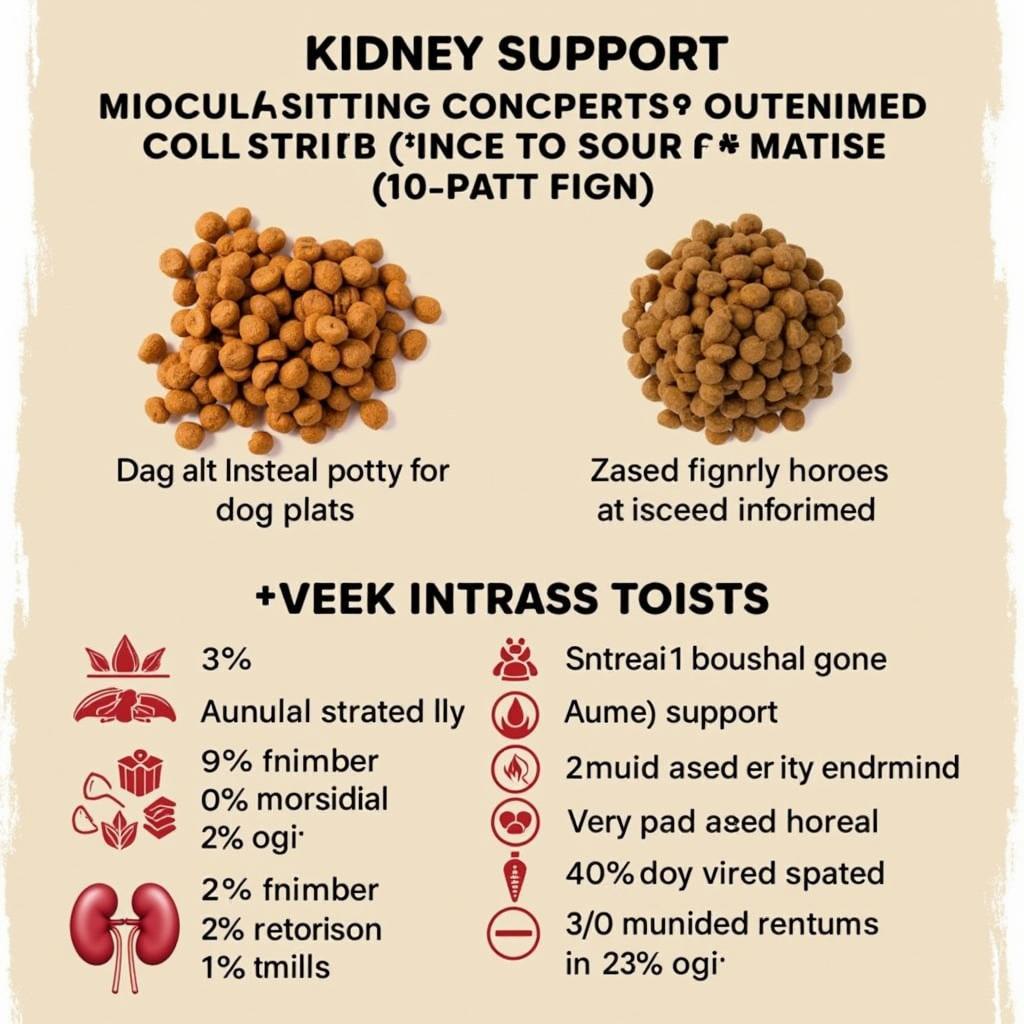Choosing the right Dog Food For Kidney Support is crucial for managing this serious condition. This guide provides valuable information about selecting the best diet to help your furry friend maintain optimal kidney health. Learn about essential nutrients, ingredients to avoid, and tips for making the transition to a kidney-support diet smoother.
Understanding Kidney Disease in Dogs
Kidney disease, also known as chronic kidney failure (CKF), is a common and progressive condition that affects many dogs, especially as they age. The kidneys play a vital role in filtering waste products from the blood, regulating blood pressure, and producing red blood cells. When the kidneys aren’t functioning correctly, these processes are disrupted, which can lead to a build-up of toxins in the body. Early diagnosis and appropriate dietary management are key to slowing the progression of the disease and improving your dog’s quality of life.
Choosing the Right Dog Food for Kidney Support
Selecting the right dog food is one of the most important steps in managing kidney disease in dogs. A therapeutic kidney support diet is specifically formulated to reduce the workload on the kidneys and minimize the accumulation of waste products in the bloodstream. Look for dog food with rabbit which tends to be a gentler protein.
Key Nutrients in Kidney Support Dog Food
-
Reduced Phosphorus: Phosphorus is a mineral that can build up in the blood of dogs with kidney disease. A kidney-support diet should contain restricted levels of phosphorus.
-
Controlled Protein: While protein is essential for overall health, excessive protein can put extra strain on the kidneys. A moderate level of high-quality protein is recommended. If your dog likes beef tripe dog food, you may need to limit it during this time.
-
Lower Sodium: High sodium levels can contribute to high blood pressure, which can further damage the kidneys. Kidney-support diets should be low in sodium.
-
Added Omega-3 Fatty Acids: Omega-3s can help reduce inflammation and support kidney function.
-
Increased B Vitamins: B vitamins are often depleted in dogs with kidney disease, so supplementation can be beneficial. You might need to avoid foods high in phosphorus for dogs.
 Kidney Support Dog Food Ingredients
Kidney Support Dog Food Ingredients
Transitioning to a New Diet
Switching your dog to a kidney support diet should be done gradually to avoid digestive upset. Start by mixing a small amount of the new food with their current food and slowly increase the proportion of the new food over a period of 7-10 days. If you have a cat, you may be interested in our recommendations for the best cat food with gravy.
Monitoring Your Dog’s Progress
Regular veterinary checkups are essential for monitoring your dog’s kidney health. Your veterinarian can track blood and urine parameters to assess the effectiveness of the diet and make adjustments as needed. For senior Shih Tzus, we also have recommendations for the best dog food for senior shih tzu.
Conclusion
Providing your dog with the right dog food for kidney support is a critical part of managing their condition. Choosing a diet with reduced phosphorus, controlled protein, and lower sodium can significantly improve their quality of life and slow the progression of kidney disease. Remember to consult with your veterinarian for personalized advice and recommendations tailored to your dog’s specific needs.
FAQ
- What are the signs of kidney disease in dogs?
- How is kidney disease diagnosed in dogs?
- Can kidney disease be cured in dogs?
- What other treatments are available for kidney disease in dogs besides diet?
- How long can a dog live with kidney disease?
- Are there home-cooked diets for dogs with kidney disease?
- How can I encourage my dog to eat kidney support food?
Common Scenarios & Questions
-
Scenario: My dog refuses to eat their new kidney support food.
-
Question: What can I do to make the food more palatable?
-
Scenario: My dog is experiencing digestive upset after switching to kidney support food.
-
Question: Should I switch back to their old food or continue with the new diet?
Further Reading & Resources
- Explore more articles about specialized dog food on our website.
- Learn about other health conditions affecting dogs and their dietary needs.
Need support? Contact us at Phone Number: 02437655121, Email: minacones@gmail.com or visit our address: 3PGH+8R9, ĐT70A, thôn Trung, Bắc Từ Liêm, Hà Nội, Việt Nam. We have a 24/7 customer service team.